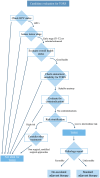Role of TORS as De-Escalation Strategy in HPV-Related Oropharyngeal Cancer, What We Need to Know
- PMID: 38786424
- PMCID: PMC11121063
- DOI: 10.3390/healthcare12101014
Role of TORS as De-Escalation Strategy in HPV-Related Oropharyngeal Cancer, What We Need to Know
Abstract
Human papillomavirus (HPV)-related oropharyngeal squamous cell carcinoma (OPSCC) presents unique challenges and opportunities for treatment, particularly regarding de-escalation strategies to reduce treatment morbidity without compromising oncological outcomes. This paper examines the role of Transoral Robotic Surgery (TORS) as a de-escalation strategy in managing HPV-related OPSCC. We conducted a comprehensive literature review from January 2010 to June 2023, focusing on studies exploring TORS outcomes in patients with HPV-positive OPSCC. These findings highlight TORS's potential to reduce the need for adjuvant therapy, thereby minimizing treatment-related side effects while maintaining high rates of oncological control. TORS offers advantages such as precise tumor resection and the ability to obtain accurate pathological staging, which can guide the tailoring of adjuvant treatments. Some clinical trials provide evidence supporting the use of TORS in specific patient populations. The MC1273 trial demonstrated promising outcomes with lower doses of adjuvant radiotherapy (RT) following TORS, showing high locoregional tumor control rates and favorable survival outcomes with minimal side effects. ECOG 3311 evaluated upfront TORS followed by histopathologically directed adjuvant therapy, revealing good oncological and functional outcomes, particularly in intermediate-risk patients. The SIRS trial emphasized the benefits of upfront surgery with neck dissection followed by de-escalated RT in patients with favorable survival and excellent functional outcomes. At the same time, the PATHOS trial examined the impact of risk-adapted adjuvant treatment on functional outcomes and survival. The ongoing ADEPT trial investigates reduced-dose adjuvant RT, and the DART-HPV study aims to compare standard adjuvant chemoradiotherapy (CRT) with a reduced dose of adjuvant RT in HPV-positive OPSCC patients. These trials collectively underscore the potential of TORS in facilitating treatment de-escalation while maintaining favorable oncological and functional outcomes in selected patients with HPV-related OPSCC. The aim of this scoping review is to discuss the challenges of risk stratification, the importance of HPV status determination, and the implications of smoking on treatment outcomes. It also explores the evolving criteria for adjuvant therapy following TORS, focusing on reducing radiation dosage and volume without compromising treatment efficacy. In conclusion, TORS emerges as a viable upfront treatment option for carefully selected patients with HPV-positive OPSCC, offering a pathway toward treatment de-escalation. However, selecting the optimal candidate for TORS-based de-escalation strategies is crucial to fully leverage the benefits of treatment de-intensification.
Keywords: HPV; TORS; de-escalation; oropharynx.
Conflict of interest statement
The authors declare no conflicts of interest.
Figures
References
Publication types
LinkOut - more resources
Full Text Sources
Research Materials



